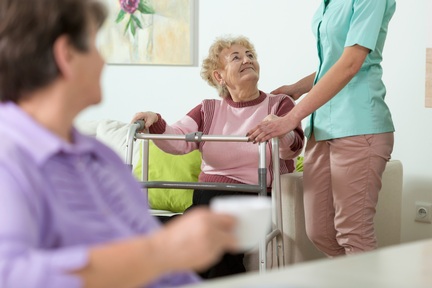Royal College of Nursing warn of EU nursing shortages after Brexit
The Royal College of Nursing (RCN) is calling on the Government to secure the future of EU nurses working in the UK following the UK’s decision to leave the European Union.
Figures from the Nursing and Midwifery Council (NMC) reveal just how much UK healthcare services and the social care sector depend on the 33,000 EU trained nurses registered to work in the UK, a figure which is currently more than the total number of nurses working in Wales.

Chief executive of the RCN, Janet Davies said: “These are uncertain times for safe staffing in the health service, and a lack of concrete assurances over the future of EU nursing staff working in the UK is making the situation worse. It is vital that valued colleagues are supported to stay.
“A sustained lack of investment in training new nurses and years of pay restraint mean many experienced nurses can’t afford to stay in the profession. Plans to change student funding and question marks over our future relationship with the EU place even greater pressure on the NHS.
“Allowing this ambiguity about our NHS workforce to continue is a completely unfair way of treating people who are caring for our friends and families every single day. It may also prompt many to leave the UK, making it even harder for the NHS to provide safe patient care.”
Damage and uncertainty
More than 9,000 EU nurses joined the NMC register in 2015-16, which is a 21 per cent increase on 2014-15 and as of 31 March 2016, there were 659,303 nurses and midwives on the NMC register. Of these, 33,248 were EU-trained, which equates to five per cent of the workforce.
The RCN’s call follows the new figures revealing the potential damage that the continuing uncertainty surrounding the future of EU nurses could have on trusts’ ability to provide safe and supporting care.
Earlier this week, the Commons Health Committee recognised that poor workforce planning had led to the NHS having too few ‘homegrown’ nurses in training and subsequently, fewer people had returned to work in the NHS after a break than originally predicted.
The RCN’s comments were published ahead of a debate in the House of Lords on the impact of the vote to leave the EU on safe staffing levels in the NHS.

The Lords debated other risks faced by the NHS workforce, such as those included in the Government’s proposals to changes in student nurse funding and bursaries.
The RCN has said that the Government must secure the futures of EU nurses. Speaking recently, chief executive of NHS England Simon Stevens urged ministers to tell foreign NHS staff that their jobs are safe post-Brexit.
Mr Stevens reinforced concerns about the future of health and care professionals from abroad, and said that the NHS would continue to rely on professionals from abroad, despite plans to increase the number of UK NHS workers.
'EU staff an integral part of the health and care family'
An estimated 55,000 out of 1.2 million NHS staff are EU citizens, including: nurses, doctors, paramedics, pharmacists, support workers and those in admin roles.
Shortly after the EU referendum result was announced, chief nursing officer for England, Professor Jane Cummings reassured EU nurses working in the NHS. She said: “I wanted to take this opportunity to confirm to all EU nurses, midwives and care assistants working in England’s health and care system that you are valued and hugely appreciated.
"You are an integral and vital part of the health and care family, and your skills and compassionate care directly benefit patients, families and communities.
“Your vital contribution to our work together will continue; you are appreciated by me and, most of all, by those we care for.”
The RCN is urging the Government to take urgent action to develop a coherent and sustainable workforce strategy for the future and security for the future that recognises the crucial work done by overseas nurses as well as the need to recruit, educate and retain a ‘homegrown’ nursing workforce.
Earlier this month, Mayor of London Sadiq Khan called for ’an immediate halt’ to the Government’s plans to replace bursaries for healthcare students with loans, warning the move could impact the recruitment of nurses and health and care services.
A Department of Health spokesman said: "NHS staff - including those from overseas - make a huge contribution to our country.
"The Government has been very clear that when we leave the EU, we fully expect that the legal status of EU nationals living in the UK, and that of UK nationals in EU member states, will be properly protected.
"Making sure we have enough nurses is a top priority for this Government. There are already 11,000 more nurses on our wards since 2010 and 50,000 nurses currently in training - with thousands more training places for home-grown nurses being created to deliver a safer, seven-day NHS."
Latest News Analysis
 04-Sep-19
Extra £1.5 billion announced for social care in Chancellor's Spending Review
04-Sep-19
Extra £1.5 billion announced for social care in Chancellor's Spending Review
 02-Jul-19
Department of Health forced to rethink care homes' nursing rates after legal challenge
02-Jul-19
Department of Health forced to rethink care homes' nursing rates after legal challenge
 18-Jun-19
Overnight care workers forced to sleep in offices and told 'bring your own bedding'
18-Jun-19
Overnight care workers forced to sleep in offices and told 'bring your own bedding'
 14-Jun-19
Back in the closet: Third of care home staff have had no LGBT+ awareness training
14-Jun-19
Back in the closet: Third of care home staff have had no LGBT+ awareness training
 11-Jun-19
PM candidates on social care: Rory Stewart calls fixing care an 'unfinished revolution'
11-Jun-19
PM candidates on social care: Rory Stewart calls fixing care an 'unfinished revolution'